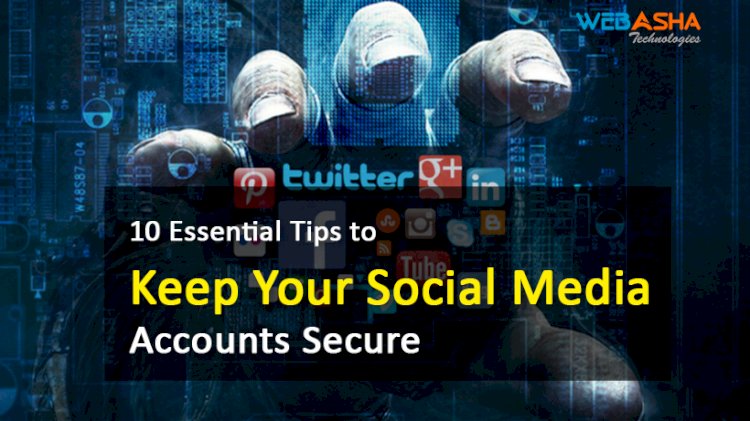10 Essential Tips to Keep Your Social Media Accounts Secure
Enhance your social media security with these 10 essential tips! Learn how to use strong passwords, enable two-factor authentication, and stay vigilant against phishing attacks. Protect your online presence today.

In today's digital age, social media has become an integral part of our lives, connecting us with friends, family, and the world at large. However, as we share our personal moments and thoughts online, the importance of securing our social media accounts cannot be overstated. From privacy breaches to identity theft, the risks associated with compromised accounts are significant. This comprehensive guide presents 10 essential tips to help you keep your social media accounts secure, ensuring your online presence remains safe and protected.
-
Use Strong and Unique Passwords
The foundation of account security lies in creating strong and unique passwords. A strong password typically includes a mix of upper and lower-case letters, numbers, and special characters. Avoid using easily guessable information such as birthdates or names. Moreover, use different passwords for each of your social media accounts to prevent a domino effect in case one account is compromised.
-
Enable Two-Factor Authentication (2FA)
Two-factor authentication adds an extra layer of security by requiring a second form of verification in addition to your password. This can be a text message, email, or authentication app code. Even if someone manages to guess your password, they won't be able to access your account without the secondary code.
-
Regularly Update Your Apps and Devices
Outdated apps and devices are vulnerable to security breaches. Hackers often exploit known vulnerabilities in outdated software. To avoid this, ensure you regularly update both your apps and devices to the latest versions, as these updates often include security patches.
-
Be Cautious of Third-Party Apps
While third-party apps can enhance your social media experience, they also pose security risks. Some apps might request unnecessary permissions, granting them access to your personal information. Before granting access, review the permissions and only allow those that are essential. Regularly review the list of connected apps and revoke access to any you no longer use or trust.
-
Beware of Phishing Attacks
Phishing attacks involve tricking users into revealing their login credentials or personal information. Hackers often use emails, messages, or fake websites to imitate legitimate sources. Always verify the sender's email address or the website's URL before clicking on any links. Avoid sharing sensitive information through unsecured channels.
-
Review Privacy Settings Regularly
Social media platforms offer various privacy settings that allow you to control who can see your posts, personal information, and friend lists. Regularly review and adjust these settings to match your desired level of privacy. Be cautious about sharing personal information publicly, as it can be used for identity theft.
-
Secure Your Email Account
Most social media platforms use email for account recovery and notifications. Therefore, securing your email account is crucial. Use a strong password and 2FA for your email as well. This prevents hackers from gaining access to your email, which could lead to unauthorized access to your social media accounts.
-
Educate Yourself about Social Engineering
Social engineering involves manipulating individuals into divulging confidential information. Hackers often use psychological tactics to trick users into sharing their passwords or other sensitive data. Educate yourself about common social engineering techniques like pretexting, baiting, and tailgating. Stay vigilant and verify the identity of anyone requesting sensitive information.
-
Log Out from Shared Devices
If you use public computers or shared devices to access your social media accounts, always remember to log out afterward. Browsers can sometimes save login credentials, leaving your account vulnerable to unauthorized access. Clear browser history and cache to ensure your information is not stored.
-
Monitor Your Accounts Regularly
Regularly monitoring your social media accounts is essential to spot any suspicious activity early on. Check for unfamiliar posts, messages, or friend requests. If you notice anything unusual, change your password immediately and report any security concerns to the platform.
Conclusion
As social media continues to shape how we interact and share our lives, it's crucial to prioritize the security of our online presence. Implementing these 10 essential tips can significantly reduce the risk of your social media accounts being compromised. By using strong and unique passwords, enabling two-factor authentication, staying updated, being cautious of third-party apps, and remaining vigilant against phishing and social engineering attacks, you'll create a robust defense against potential threats. Regularly reviewing privacy settings, securing your email account, and logging out from shared devices further solidify your security measures. Finally, consistent monitoring ensures that any suspicious activity is promptly addressed. Remember, a proactive approach to social media security allows you to enjoy the benefits of connectivity without compromising your personal information and digital identity.











![Top 10 Ethical Hackers in the World [2025]](https://www.webasha.com/blog/uploads/images/202408/image_100x75_66c2f983c207b.webp)

![[2025] Top 100+ VAPT Interview Questions and Answers](https://www.webasha.com/blog/uploads/images/image_100x75_6512b1e4b64f7.jpg)









